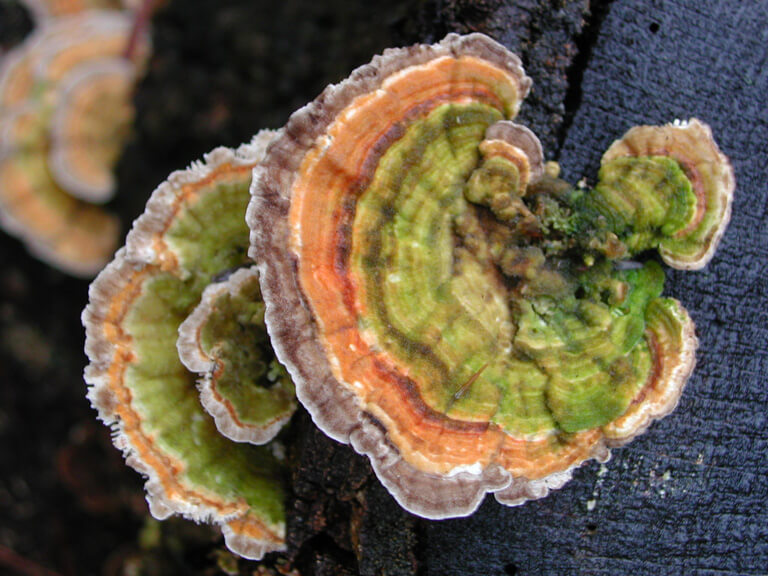A study reveals that the substance extracted from the Turkey tail tree mushroom, which is used in China and Japan as an anti-cancer agent, has the ability to inhibit prostate cancer stem cells

Dina Volodarsky Galileo
Prostate cancer is the most common malignant disease among men in Western countries. If the disease is diagnosed at a late stage, when surgery is no longer possible, patients are treated with drugs. However, most tumors eventually develop resistance to treatment and the patients reach the terminal stage of the disease.
The conventional treatment for prostate cancer focuses on sorted cancer cells, and according to new research it is cancer stem cells (CSC) that are responsible for the creation of the tumor and its spread. Cancer stem cells have the ability to renew themselves and differentiate into malignant cells. Moreover, cancer stem cells are highly resistant to various chemotherapy treatments.
Researchers from the University of Queensland in Australia and the University of Hong Kong have published their findings regarding the treatment of cancer stem cells for prostate cancer. The study was published this year in the journal Plos One. The researchers, led by Patrick Ling, showed for the first time that the glycopeptide (sugary peptide) PSP (ie: Polysaccaropeptide) extracted from the mushroom known as Turkey tail, inhibits cancer stem cells and prevents the formation of tumors and their spread. The mushroom is known for its medicinal properties.
Inhibiting the formation of tumors in the prostate
In the first stage, the experiments were conducted in cell culture originating from a prostate cancer tumor. The cells were treated with PSP in different doses and for different periods of time and the researchers tested whether the cells express the markers typical of cancer stem cells. From these experiments it became clear that the longer the dose of PSP and the longer the duration of treatment, the lower the amount of markers that characterize cancer stem cells. Later, the researchers wanted to test the effect of the PSP in live mice (in vivo) and not be satisfied with experiments in cells.
Ling and his colleagues injected tumor cells, which express the luminous protein luciferase, into mice whose immune systems are weakened. The luminous protein made it possible to track the cells in the mouse's body. All the mice that received the cancer cells developed tumors two weeks after the injection. In contrast, when the cancer cells were treated with PSP prior to injection into mice, three out of eight mice did not develop tumors even four weeks after injection.
The PSP was found to be effective
In the next step, the effect of the substance PSP on genetically modified mice, which develop prostate cancer tumors spontaneously, was examined. Eight such mice received in food a dose of 300mg/kg of PSP for 20 weeks. At the end of the treatment period, the prostate tissue was examined. Compared to tumors found in all the mice that served as a control group and received only water and not PSP, none of the eight mice that received PSP had prostate tumors!
That is, in these mice the PSP completely inhibited the formation of tumors. It should be noted that the long treatment duration of 20 weeks was essential, as only four weeks of treatment failed to prevent the appearance of tumors. However, the high dose and prolonged treatment time did not cause any side effects in the mice.
The mechanism by which PSP works has not yet been fully clarified, although researchers have shown that the treatment of cancer stem cells with PSP does not cause apoptosis (planned cell death) or stop the cell division cycle, but inhibits the phosphorylation of a protein known as Akt and lowers the expression of the beta protein -catenin (catenin). It is possible that this is how the damage to the pathway responsible for renewing the stem cells occurs.
The researchers emphasize that in the past various compounds were tried against prostate cancer, but these were only 70% effective, while PSP looks very promising because it was able to inhibit 100% of the tumors, without any side effects being observed. This is the first time that PSP has been shown to be effective against cancer stem cells, and these findings can help in the development of new drugs for the treatment of prostate cancer and possibly other malignant diseases.
Dina Volodarsky has a master's degree in life sciences from the Weizmann Institute of Science and a bachelor's degree in life sciences from the Hebrew University
The full article was published in Galileo magazine, July 2011

2 תגובות
The real question is: is this mushroom tasty or should it be shoved up your ass?
A real medicine grown in nature and not in the laboratory of drug manufacturers, nonsense.